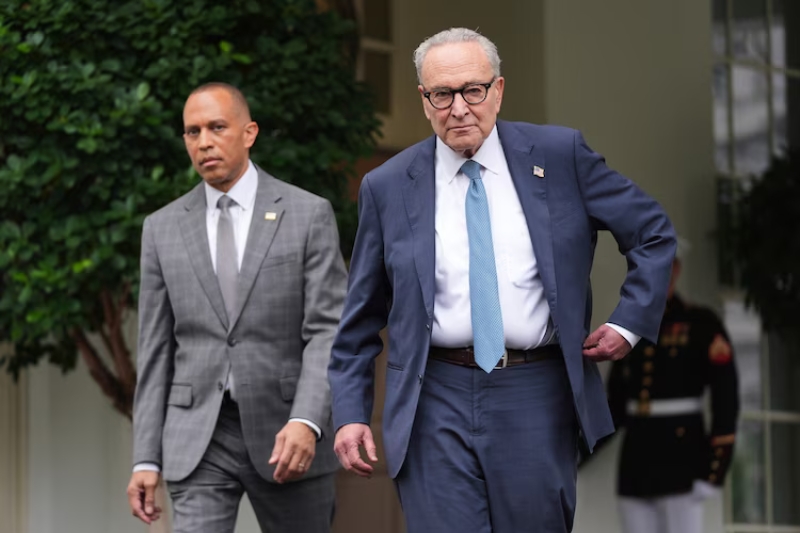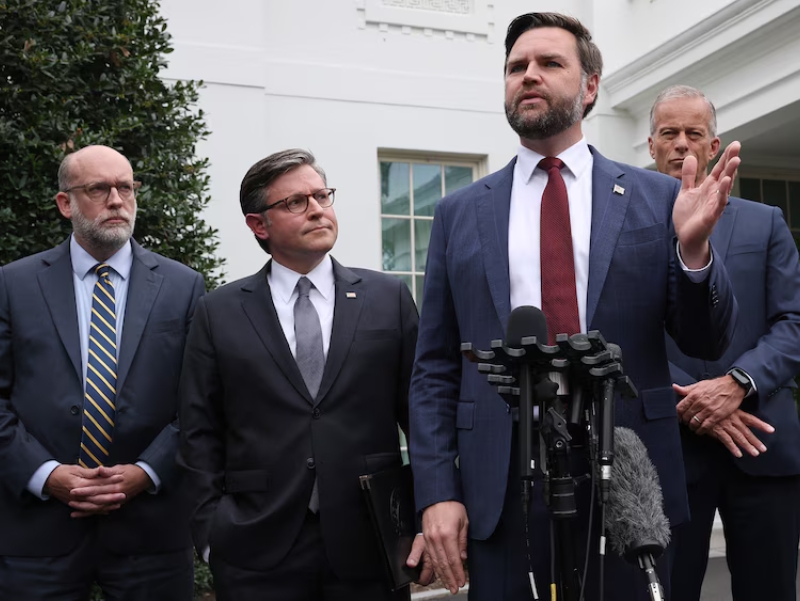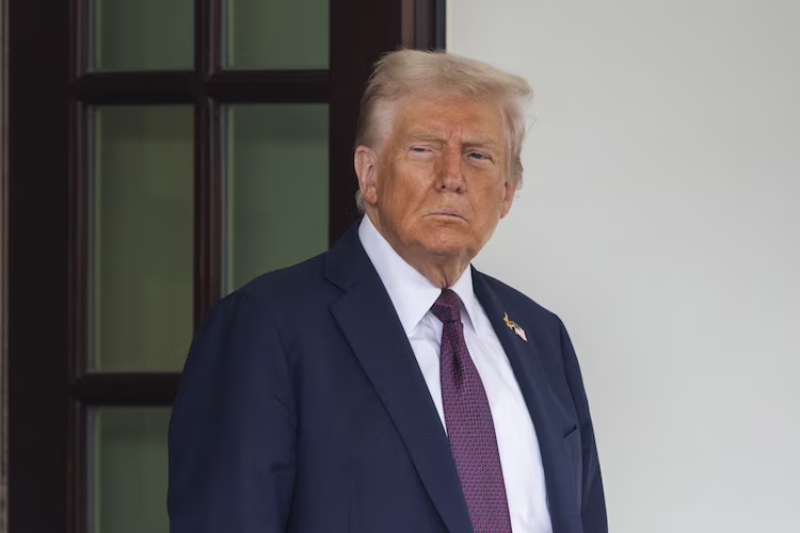Congressional leaders left a meeting with President Donald Trump at the White House Monday afternoon without a deal to avert a government shutdown that could go into effect in little more than a day later on Tuesday night.
After the meeting, the top Democrats and Republicans blamed each other for a potential government shutdown if there's a lapse in federal government funding at the end of the day Tuesday.
Senate Minority Leader Chuck Schumer told reporters in the White House driveway that "large differences" remain -- particularly on health care.

Senate Minority Leader Chuck Schumer and House Minority Leader Hakeem Jeffries walk speak to members of the media outside the West Wing at the White House in Washington, Sept. 29, 2025, in Washington. Evan Vucci/AP
A few minutes later, Vice President JD Vance joined Republicans in saying a shutdown was increasingly likely.
"I think we’re headed to a shutdown because Democrats won’t do the right thing," Vance said.

Vice President JD Vance talks to reporters outside the White House, Sept. 29, 2025, in Washington, as Director of the Office of Management and Budget, Russell Vought, Speaker Mike Johnson and Senate Majority Leader John Thune listen. Win McNamee/Getty Images
Back at the Capitol, the blame-placing continued.
“They just wanted to kick the health care problem down the road,” Schumer told reporters.
“[If] the government shuts down, it's because Republicans have decided to shut the government down and hurt the American people,” House Minority Leader Hakeem Jeffries said.
The high-stakes meeting with Trump was a last-ditch effort for both sides to come together to negotiate. Without a deal, there appears to be a greater chance of a government shutdown starting early Wednesday morning.
Hours before the meeting, White House press secretary Karoline Leavitt said that there's "nothing to negotiate" with bipartisan congressional leadership Monday -- as the administration continues to push lawmakers to pass a short-term funding bill known as a clean clean continuing resolution.
"Our message and what we want out of this is very simple: The president wants to keep the government open. He wants to keep the government funded. There is zero good reason for Democrats to vote against this clean continuing resolution,” Leavitt told reporters at the White House Monday morning. “The president is giving Democrats one last chance to be reasonable today.”

President Donald Trump waits to greet Israeli Prime Minister Benjamin Netanyahu at the White House, Sept. 29, 2025, in Washington. Jim Lo Scalzo/EPA/Shutterstock
Lawmakers from both sides of the aisle are digging in ahead of the Tuesday night deadline -- with Democrats maintaining their posture that they will not vote to keep the government open without lofty health care concessions.
Those demands include restoring $1 trillion in Medicaid cuts passed into law this summer on top of a permanent extension of the Obamacare subsidies set to expire at the end of the year, saving health insurance for 3.8 million people at a cost of $350 billion over the next decade, according to the Congressional Budget Office.
"House Democrats, Senate Democrats are in lockstep," Jeffries told reporters Monday morning at the Capitol, adding that he was heading to the meeting to have "a good faith negotiation about landing the plane in a way that avoids a government shutdown but does not continue the Republican assault on the health care of the American people."
The meeting marked the first bicameral, bipartisan congressional leadership face-to-face meeting of Trump’s second term -- and came after a previously scheduled meeting last week was nixed by the president after he said he reviewed the Democratic proposal and judged that a meeting would not be productive.
"Republicans control the House and the Senate, and as a Republican president, if the government shuts down, it's because Republicans want to shut the government down," Jeffries said.
After the White House meeting, some Democratic senators appeared to be willing to take the blame for a shutdown over their demands to restore health care funding.
"Well, there will be the blame game, and you guys, you guys will be making your decisions on who to assign the blame. But the bottom line here, it's a shared situation," Sen. Peter Welch of Vermont said. “So you've got this situation where there have been no negotiations [from Republicans], and then you've got this crisis in health care, which is an enormous concern for us,” Welch added.
Virginia Sen. Tim Kaine, who represents the state with the second-highest number of federal employees, said he’s concerned about the shutdown’s potential impact and the additional layoffs that Trump has threatened. But he still believes this is the moment for Democrats to hold the line.
“I don't think there's a problem in asking that a deal be a deal, and that we address health care needs for my constituents,” Kaine told reporters Monday evening. "I mean, isn't this is the way this is done. We're willing to negotiate. President Trump told the House, don't even deal with the Democrats in coming up with the proposal. We put an alternative on the table. Is there, is there something wrong with that? Putting up an alternative?
Monday's meeting was agreed to after Schumer implored Senate Majority Leader John Thune for help getting through to Trump, according to a Schumer aide -- though Jeffries seems unmoved by the prospect of drawn-out negotiations.
Last week, the White House issued guidance to federal agencies that they should consider executing a reduction in force for federal employees whose jobs are not deemed essential to government operations -- a move intended to increase pressure on Democrats who have a stated goal to protect a federal workforce that’s already been slashed by the Trump administration.
While House Republicans passed a stop-gap measure to keep the government open through Nov. 21, the measure has stalled in the Senate, where at least seven Democrats must vote for any measure that staves off a shutdown.
Republicans crafted a "clean" seven-week stop-gap bill in order to create more time for congressional appropriators to work through regular order: 12 separate full-year funding bills. Congress has not passed all 12 appropriations bills through regular order since 1997, and the task has only been completed four times since 1977 when current budget rules took effect.
Speaker Mike Johnson maintained over the weekend that passing the short-term continuing resolution is "buying a little time" for the regular appropriations process.
"The Obamacare subsidies is a policy debate that has to be determined by the end of the year, Dec. 31 -- not right now, while we're simply trying to keep the government open so we can have all these debates," Johnson said on CNN on Sunday.
The federal government has shut down due to a lapse in appropriations 10 times since 1980, with the longest shutdown, 35 days, occurring during the first Trump administration.





